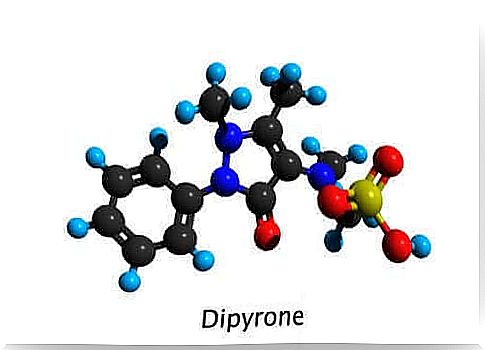The Features And Applications Of Novalgin

Novalgin is a drug consisting of metamizole or dipyrone. It belongs to the pyrazolone group and has analgesic and fever-reducing effects. However, Novalgin also has less potent anti-inflammatory and anti-spasmodic properties. In this article you can discover the features and uses of Novalgin.
How Novalgin works

Like all other drugs in this group , dipyrone or metamizole works by inhibiting the action of cyclooxygenase. It therefore inhibits prostaglandin synthesis thanks to its analgesic and fever-reducing properties.
Despite this and despite the fact that its metabolites are also active and inhibit prostaglandin synthesis, its anti-inflammatory activity is not high.
In addition , metamizole relaxes and reduces the activity of the smooth muscles of the gastrointestinal tract and uterus. Dipyrone or metamizole can be administered orally, intramuscularly or intravenously. The liver metabolizes Novalgin quickly. There it is converted into active metabolites which are excreted in the urine.
Applications of Novalgin
Novalgin is used to treat post-traumatic or post-operative moderate or severe pain and spasms. Doctors also prescribe it in case of high fever that does not respond to other measures or antipyretic drugs.
Dosage and Contraindications

The dose depends on the desired analgesic effect and the patient’s situation. In general, the usual adult dose is between 8 and 16 mg/kg body weight.
Parenteral administration is associated with an increased risk of anaphylactic reactions. To treat fever in children, doctors may indicate a dose of 10 mg/kg body weight.
The analgesic and antipyretic effects are manifested 30 to 60 minutes after administration. Physicians should carefully monitor parenteral doses greater than 1 g due to the risk of hypotension.
Experts also recommend diabetics to take tablets or drops instead of syrup. In addition , patients with renal or hepatic failure should avoid taking higher doses. In addition, as for contraindications, Novalgin should not be used in the following situations:
- Hypersensitivity to pyrazolones.
- Acute or chronic renal or hepatic failure.
- blood disease.
- Active duodenal ulcers.
- Heart failure.
- Pregnant and breastfeeding women.
In addition, physicians should evaluate their patients haematologically before treatment and periodically during treatment. This is to be able to properly evaluate possible side effects.
Effects
Metamizole or dipyrone is a pain reliever that has been withdrawn from the market in many countries because of its toxic effects, especially because of the risk of agranulocytosis. Available information indicates that its use leads to severe hypersensitivity reactions. These include:
- Agranulocytosis. Although not very common, it is a serious and sometimes irreversible reaction. It is an immunological reaction whose origin is unknown. Read an English scientific study on the subject here.
- shock. Another serious hypersensitivity reaction. The symptoms include itching, cold sweats, drowsiness, nausea, shortness of breath, and skin discoloration.
Agranulocytosis and shock endanger the patient’s life and require treatment to be discontinued. In these cases, patients need immediate medical attention.
In addition, the patient may suffer from skin-associated hypersensitivity reactions, especially in the ocular mucosa and nasopharyngeal region. Other reactions include leukopenia, thrombocytopenia and hemolytic anemia.
Recommendations for Healthcare Professionals

The Spanish Agency of Medicines and Medical Devices (AEMPS) analyzed the situation of metamizole in Spain regarding cases of agranulocytosis. For this reason, it insists that people remember that it is a prescription drug. It also made the following recommendations to healthcare professionals:
- Only use metamizole for short-term treatments of up to seven days.
- Use this drug only if it meets the approved recommendations and the minimum effective dose.
However, if longer treatment is needed, you will need periodic hematologic evaluations, including blood comparisons. So do not prescribe this drug to patients you cannot evaluate.
Conclusion
Before prescribing Novalgin, doctors should take a detailed medical history. In addition, they should avoid prescribing it to patients with a history of hypersensitivity or hematologic reactions to this drug.
We hope this article on the uses and applications of Novalgin has been helpful to you. And always contact your doctor or pharmacy for more information.









